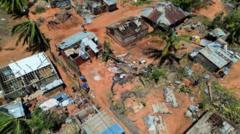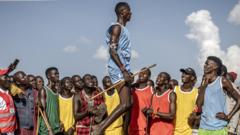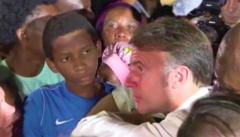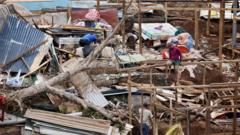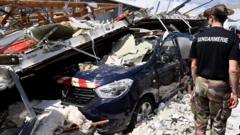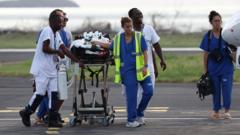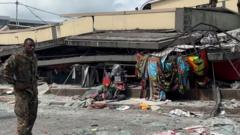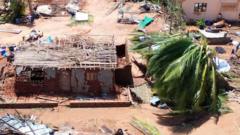Following the destruction caused by Cyclone Chido, Mayotte grapples with a humanitarian crisis as residents face shortages of food, water, and shelter. The storm's wreckage has intensified scrutiny on the French government's response and migration policies.
Cyclone Chido Devastates Mayotte: A Community in Crisis
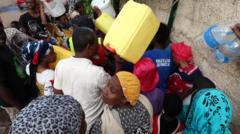
Cyclone Chido Devastates Mayotte: A Community in Crisis
The French Indian Ocean territory of Mayotte faces destruction and humanitarian challenges following Cyclone Chido, which left a trail of devastation.
Cyclone Chido has wrought unprecedented destruction on the French Indian Ocean territory of Mayotte, with reports indicating at least 31 fatalities and many residents still unaccounted for. The cyclone, which struck on Saturday with winds exceeding 220 km/h (140 mph), transformed the once lush landscape of rolling hills and coconut trees into a barren wasteland, with downed tree trunks and damaged infrastructure painting a stark picture of the aftermath.
As journalists like Mayeni Jones from the BBC report, the immediate effects are striking: the local airport's signal tower is mangled and even the airport hotel, which once served as a refuge with some operational wi-fi and electricity, now bears a damaged roof and shattered windows. The disaster has prompted the French government to declare a state of exceptional natural disaster, recognizing the severity of the situation in one of France's poorest regions, where many inhabitants reside in informal settlements.
Amid this crisis, French President Emmanuel Macron visited the island with emergency aid, including food and health resources. However, his administration's inadequate investment in Mayotte has drawn criticism, with some arguing that the devastation reflects broader systemic neglect. In light of ongoing debates surrounding migration policies—particularly concerning the substantial number of illegal migrants in the region—political tensions have heightened, complicating the government's response to the disaster. Critics express concern that providing extensive aid could inadvertently encourage more migration to the territory.
As Mayotte's residents struggle to recover from the storm that has wiped away their livelihoods, they must also cope with a new curfew imposed to prevent looting. Emergency services are working to restore power and clean up debris, but the delivery of essential resources like food and clean water remains a critical challenge. Health officials are worried about the potential outbreak of infectious diseases due to water shortages and the precarious living conditions exacerbated by the cyclone's destruction.
The storm has not only devastated Mayotte but has also inflicted damage across the African mainland, with reported casualties in Mozambique and Malawi. The complex web of natural disaster and socio-political challenges continues to unfold as the community navigates this catastrophic event, highlighting the need for a coordinated and compassionate response from both local and national authorities.

